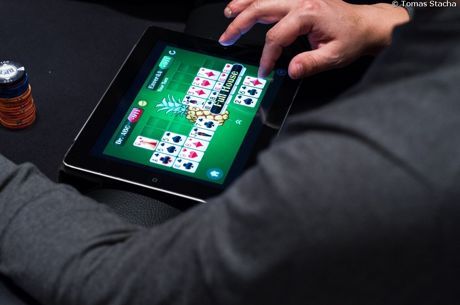Bankroll Builders, Vol. 6. Part 2: $10 No-Limit Hold’em Cash Games

In Part 1 of this article we outlined the bankroll requirements for $10 buy-in no-limit hold’em and gave you a few ideas about where to play and how many tables to simultaneously attempt. Now, we’ll get down to the nitty-gritty and discuss basic strategy and some adjustments to make for six-handed play. With some diligent study and a lot of patience, you’ll be hooking the fish and growing your bankroll in no time.
Tips from the Trenches
Expand your range of starting hands. When playing six-max NLHE, you’ll be able to loosen up your starting hand requirements quite a bit. From early position, you should be open-raising any pair, any big-suited Broadway hands (AKs-ATs, KQs, KJs, QJs), and suited connectors from JTs down to 65s. Also, open any suited ace or big offsuit Broadway cards like AKo, AQo, AJo, ATo, and KQo. All of these hands have the potential to hit a flop well. The small pairs and suited connectors will also be simple to play; you’ll either flop a set or a big draw or you’ll flop nothing and will be able to make an easy fold. Open these hands for 2.5-3x the big blind.
When the action is folded to you on the button or in the small blind, open even a wider range of hands. Include unsuited aces, suited kings, suited queens, suited gappers like J9s, T8s, and 97s, some unsuited connectors like JTo, T9o and 87o. Expand your steal range in this spot to include about 40 percent of your hands and you’ll start picking up a whole lot of dead money. Even if you open on the button with a junky hand like J8o and get called by one of the blinds, you’ll still be playing the hand in position after the flop.
Speaking of the blinds, pay close attention to how the two opponents on your left are playing. These are the players who will be in the blinds when you’re on the button. Are they staying pretty tight or are they defending and three-betting a lot?
- Ramp up your continuation betting. If you were the initial preflop raiser, do more than your fair share of continuation betting on the flop. Most of the time you should find yourself playing from position and if the action is checked to you, a c-bet will take down the pot enough of the time that it’s a profitable action, even if you completely missed. As you contemplate a c-bet, note the texture of the flop. If you raised from the cutoff with K♣Q♣, were called by the small blind and the flop comes down 9♥9♠3♦, c-bet if the action is checked to you, as it’s very unlikely the flop hit your opponent’s hand. Conversely, if you’re holding K♣Q♣ and the flop is 10♦8♦7♦, a c-bet is probably not the best idea given the number of draws on that board.
- Practice good table selection. Table selection can greatly affect one’s success at $10 NLHE. Look for tables where most of your potential opponents have a full buy-in (or close to it) sitting in front of them. Avoid ones where there are multiple short stacks (below $5). Stay on top of the conditions at your table. If there seem to be more reasonable players at your table than erratic or fishy ones, find a new table. There are plenty of donkeys out there at this limit.
- Review your sessions. If you’re serious about building a bankroll, take the time to review your sessions and re-examine some of your trouble hands. If you’re confused about whether or not a play you made was optimal or not, talk it through with a player you respect or post it on a forum like Two Plus Two or Pocket Fives and get an objective look at your play.
- Take your game to the next level. If your results are good and you want to get serious about no-limit hold’em cash games, consider joining a training site to sharpen your game even further. CardRunners has an amazing program called Truly Free Poker Training, which rewards you with free weeks on CardRunners or Stox Poker based on the Full Tilt Points you earn in a given month. You don’t even have to spend the points to get the training time — just earn them. If you’re already a CardRunners member, check out Verneer’s brilliant six-part series “Climbing Mt. Micro.”
Ready to start building your own bankroll? Open an account at one of our online poker rooms today and get on the grind.








